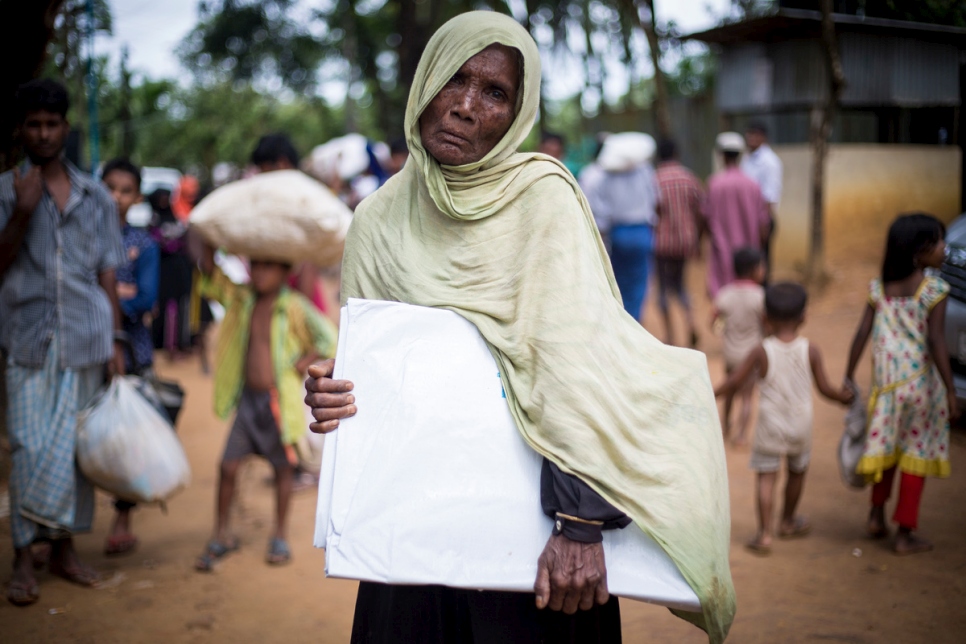Moving refugees out of the rain in Bangladesh
To beat monsoon downpours, UNHCR is providing tarps to Rohingya as they cross the border from Myanmar.
KUTUPALONG REFUGEE CAMP, Bangladesh – Reed thin, barefoot and fragile, refugee grandmother Suruz Jahan trekked for days through the rain to escape violence in Myanmar.
After reaching Bangladesh under threatening monsoon skies, the 75-year-old was first in line to collect a tear-resistant tarpaulin – a vital first step to putting her life back together at this fast-growing refugee camp.
“It’s like I’ve found my father and mother again."
“It’s like I’ve found my father and mother again,” said Suruz, in a faint voice, weeping softly. “Now I have shelter, I can start looking for food.”
In a massive effort to cut the time Rohingya refugees like Suruz spend in the open, UNHCR, the UN Refugee Agency, this week started giving plastic sheeting to them the moment they arrive at refugee settlements in Bangladesh from Myanmar.

Rohingya refugees have been fleeing Myanmar at a staggering rate (Roger Arnold and Ismail Ferdous, camera / Boris Weber, producer)
Teams are also scouting known crossing points on the border with Myanmar, to hand plastic sheets and other aid to refugees like Suruz, her son and two grandchildren, as soon as soon as they enter the country.
“With these harsh weather conditions, the idea is that we will be able to provide them, on arrival, at least with something to cover their heads,” said Felipe Camargo, who is leading UNHCR’s emergency response in Bangladesh.
There are an estimated 501,000 women, children and men who have arrived in this South Asian country in the last month, and the number is growing by the day, Camargo said.
The vast majority live in informal camps and roadside settlements in southeast Bangladesh, where large family groups, often from the same villages in Myanmar, frequently group together to maintain their ties.
To ensure that the aid ripples swiftly through these communities in exile, Camargo has instructed UNHCR field workers to hand out two or three tarps at a time to individuals.
“There is a very strong community solidarity mechanism – so this is a way to ensure that as many people as possible receive what is needed,” he said, adding: “If the plastic is not used for the roof, it will be used for the floor.”
“This will spare us from the rain."
Among those picking up the tarps under a lowering monsoon sky was 18-year-old new arrival Abdu Sukkur.
“This will spare us from the rain … and help us to get started,” Abdu said.
As the tarp distribution picks up pace, the 2,000-acre (809 hectare) Extension Site on the outskirts of Kutupalong Camp is already becoming more organized.
To make it easier to bring aid into Kutupalong Extension Site , the Bangladeshi Army started constructing a road this week.
The UN Refugee Agency is also urgently shipping in 23 vehicles to assist in aid efforts led by Bangladeshi authorities, including 10 pick-up trucks that will be donated to the government.
Your support is urgently needed to help the children, women and men refuges in Bangladesh. Please give now.


